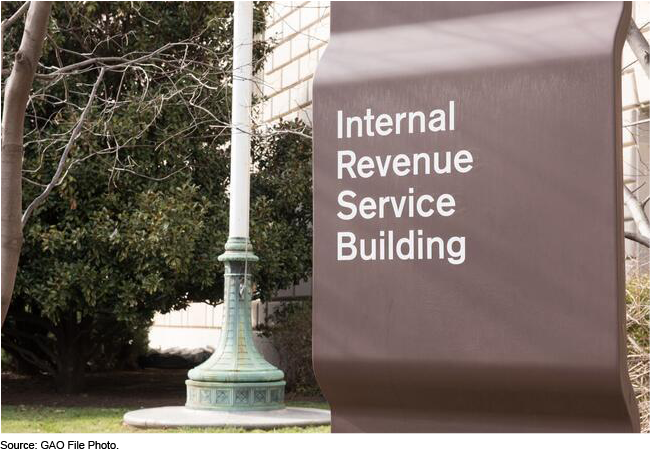Financial Audit: IRS's FY 2021 and FY 2020 Financial Statements
Fast Facts
The Internal Revenue Service collects taxes to fund federal programs and services.
In FY21, IRS collected over $4.1 trillion in taxes and paid out more than $1.1 trillion in tax refunds, credits, and other payments—including over $569 billion related to COVID-19.
We audit and issue opinions annually on IRS's financial statements and on related internal controls (e.g., processes to reasonably assure that transactions are properly authorized and recorded).
In FY21, we found the statements were reliable and that controls over financial reporting were effective—although some information system and unpaid assessments controls could be improved.

[Note: The dollar amount of tax refunds, credits and other payments was listed incorrectly in an earlier version and has been updated.]
Highlights
What GAO Found
In GAO's opinion, the Internal Revenue Service's (IRS) fiscal years 2021 and 2020 financial statements are fairly presented in all material respects, and although certain controls could be improved, IRS maintained, in all material respects, effective internal control over financial reporting as of September 30, 2021. GAO's tests of IRS's compliance with selected provisions of applicable laws, regulations, contracts, and grant agreements disclosed no instances of reportable noncompliance in fiscal year 2021.
Limitations in the financial systems IRS uses to account for federal taxes receivable and other unpaid assessment balances, as well as other control deficiencies that led to errors in taxpayer accounts, continued to exist during fiscal year 2021.These control deficiencies affect IRS's ability to produce reliable financial statements without using significant compensating procedures. In addition, unresolved and newly identified information system security control deficiencies in such areas as access controls and configuration of security settings increased the risk of unauthorized access to, modification of, or disclosure of sensitive financial and taxpayer data and disruption of critical operations in fiscal year 2021.
IRS continues to take steps to improve internal controls in these areas. However, the remaining deficiencies are significant enough to merit the attention of those charged with governance of IRS and therefore represent continuing significant deficiencies in internal control over financial reporting related to (1) unpaid assessments and (2) financial reporting systems. Continued management attention is essential to fully addressing these significant deficiencies.
The Consolidated Appropriations Act, 2021, enacted in December 2020, and the American Rescue Plan Act of 2021, enacted in March 2021, as well as other COVID-19 pandemic relief laws, contained a number of provisions, including the second and third rounds of direct payments (i.e., economic impact payments) totaling over $569 billion in fiscal year 2021, for eligible individuals to address financial stress caused by the COVID-19 pandemic. As part of monitoring and oversight of the federal government's efforts to prepare for, respond to, and recover from the COVID-19 pandemic, GAO has issued a number of reports on federal agencies' implementation of COVID-19 pandemic relief laws, including reports providing information on, and recommendations to strengthen, IRS's implementation of the tax-related provisions. Similar to GAO's prior year findings for the processing of the first round of economic impact payments, GAO's work in fiscal year 2021 found that IRS faced challenges issuing the second and third rounds of payments to certain eligible recipients and preventing improper payments.
In commenting on a draft of this report, IRS noted its intention to continue working to improve its internal controls.
Why GAO Did This Study
In accordance with the authority conferred by the Chief Financial Officers Act of 1990, as amended, and because of the significance of IRS's tax collections to the consolidated financial statements of the U.S. government, which GAO is required to audit, GAO annually audits IRS's financial statements to determine whether (1) the financial statements are fairly presented and (2) IRS management maintained effective internal control over financial reporting. GAO also tests IRS's compliance with selected provisions of applicable laws, regulations, contracts, and grant agreements.
IRS's tax collection activities are significant to overall federal receipts, and the effectiveness of its financial management is of substantial interest to Congress and the nation's taxpayers.
For more information, contact Dawn B. Simpson at (202) 512-3406 or simpsondb@gao.gov.
